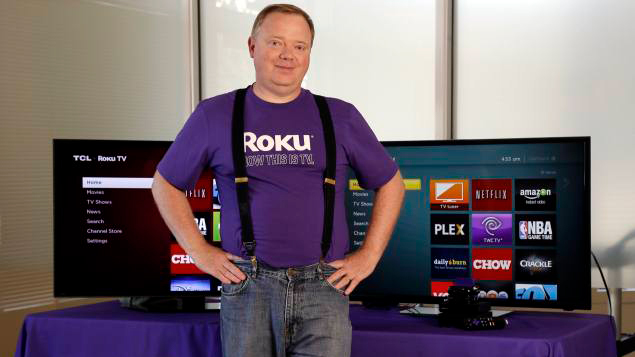Amazon Could Have Had Roku for Only $690 Million?!!!
CNBC’s compelling deep dive into Roku, and its close intersection with Netflix, is chock full of company history and forward-looking insight

The smarter way to stay on top of the streaming and OTT industry. Sign up below.
You are now subscribed
Your newsletter sign-up was successful
Amid a jagged but steeply upward trajectory that has seen its market capitalization increase to just below $50 billion, Roku has often been compared to Netflix, a company that also had its roots in physical goods (DVDs) but made its real bones in streaming content.
With Roku executing a somewhat similar pivot — branching out into original shows and movies, and making far more selling advertising on the Roku Channel than selling hockey-puck-style OTT players and licensing smart TV OS — CNBC interviewed company founder and CEO Anthony Wood.
Writer Alex Sherman penned a can’t-miss 3,365-word deep dive into a Roku company history that’s inextricably tied to Netflix, blended with some essential forward-looking analysis that requires unmistakable comparisons to the world’s most profitable streaming company.
Also: Wood Says Samsung, LG, Vizeo Will Eventually License OS From Elsewhere
Again, we’re just aggregating a darned fine piece of media-tech journalism here — so here’s that CNBC link again. And for the sake of abstracting this lengthy read, and justifying our posting on it, here are six nuggets that we thought were particularly interesting.
> The Manchester-born Wood, who ended up living in Texas and getting an electrical engineering degree from Texas A&M, founded ReplayTV in the 1990s. As you may recall, ReplayTV had a kind of “betamax” role vs. TiVo in the formative years of the DVR. (Although, unlike Sony’s seminal "format war" with JVC's VHS two decades before that, ReplayTV wasn’t necessarily the superior device.) Wood did end up selling ReplayTV to SonicBlue for $120 million, affording him the ability to up his game as a video tech entrepreneur.
> In the early aughts, more than a decade prior to the emergence of Spotify, Wood created a music streaming device to compete with Apple’s download-focused iPod player. “I was a little early on that one,” he conceded to CNBC.
The smarter way to stay on top of the streaming and OTT industry. Sign up below.
> After meeting Netflix founder and co-CEO Reed Hastings at conference events, Wood nagged -- and convinced -- Hastings to let him build a connected TV gadget for Netflix. “There was Xbox and PlayStation and Samsung and Apple TV,” Hastings said, describing the limited number of devices available 2008 that would allow users to stream internet video on their TVs. “Frankly, we didn’t think Roku had much of a chance.” Wood worked as a part-time Netflix employee for nine months, while also still leading the 15-person Roku team. Ultimately, Hastings bailed on the project, fearing that other platform providers wouldn’t support the Netflix app if the company had its own proprietary connected TV device.
> Roku crafted a simple, elegant user interface, with an equally simplistic remote control design. “Many companies just don’t really understand the attitude people have when they’re watching TV,” Wood said. “People want to sit there, drink their beer, and watch TV.” Roku hardware achieves niche popularity, but Wood’s pitch was — then and to this day — about the platform. Once it’s infiltrated, Roku will become an essential arbitrator of content and ad sales. But Silicon Valley investors still see Roku as a hardware company, one whose tech can be easily copied. “We’ve had less acquisition offers than is normal for a company as successful as Roku,” Wood said.
> But there some venture capitalists who believe in Roku, notably Menlo Ventures’ Shawn Corolan, who helps lead the company to its successful IPO in 2017, mainly by focusing it on growth of its platform revenue. And there were some suitors. In 2012, Intel, which was developing the OnCue video tech platform that it eventually sold to Verizon, offered to pay $450 million to Roku. Wood wanted $1.5 billion, a number he arrived at based on the money he thought he’d need to fulfill his dream, founding a university in his home state of Texas. Later, Amazon offered $300 million: Roku was willing to go down to $690 million, but the two sides couldn’t reach an agreement.
> With Wood now focused on building the Roku Channel, and starting to license and purchase original content to feed that beast, CNBC makes inevitable comparisons to Hastings and Netflix, who bought pretty much any piece of content they could get their hands on in the more formative “Albanian Army” years of Netflix streaming. MoffettNathanson principal analyst Michael Nathanson has advice for any media company which might offer support to Wood’s latest pivot: “I’d argue companies giving Roku content are digging their own grave,” he said. ■
Daniel Frankel is the managing editor of Next TV, an internet publishing vertical focused on the business of video streaming. A Los Angeles-based writer and editor who has covered the media and technology industries for more than two decades, Daniel has worked on staff for publications including E! Online, Electronic Media, Mediaweek, Variety, paidContent and GigaOm. You can start living a healthier life with greater wealth and prosperity by following Daniel on Twitter today!

